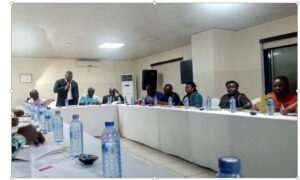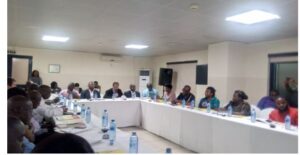STANDARD OPERATING PROCEDURE FOR IMPLEMENTING HIV PROGRAMMES AMONG KEY POPULATIONS RELEASED

 Ghana has achieved notable success in the response to the HIV epidemic by reducing the overall adult HIV prevalence from 2.4 percent in 1998 to 1.62 percent in 2016.
Ghana has achieved notable success in the response to the HIV epidemic by reducing the overall adult HIV prevalence from 2.4 percent in 1998 to 1.62 percent in 2016.
The decline can be attributed to the advances made in National HIV Response through various strategies and initiatives that involved all level of government, civil society and partners.
2016 Ghana AIDS Commission (GAC) estimates show that the number of new HIV infections has increased from 12,077 in 2011 to 20,418 in 2016, hence, the need to improve on the quality of services and intensify education on HIV infections for Key Populations (KPs). Facilitated through leadership from GAC, the National AIDS Control Programme (NACP) of the Ghana Health Service, USAID Strengthening the Care Continuum project and the National Key Populations Standard Operating Procedures (National KP SOP), this Standard Operating Procedure (SOP) is a reviewed version of the one developed in 2014.
“The review was based on global evidence and country experiences in the implementation of HIV prevention, treatment and care services for KPs” says Dr. Amb. Mrs. Makowa Blay Adu-Gyamfi, Ag. Director General at GAC. The document underscores the need for stringent measures required for streamlining HIV services to KPs which is essential for achieving the UNAIDS 90-90-90 target for HIV intervention. The UNAIDS 90-90-90 stipulates that countries work towards attaining the following;
- 90% of people with HIV are aware of their infection,
- 90% of people diagnosed with HIV are linked to anti-retroviral treatment( ART), and
- 90% of those on ART adhere and have undetectable levels of HIV in their blood.
 Mr. Kyereme Atuahene, Director or Research, Monitoring and Evaluation, who gave a welcome remark on behalf of the Acting Director General of GAC, congratulated the consulting team and key stakeholders for their tremendous contributions during the review of the SOP. He also mentioned the upcoming National HIV and Aids Research Conference (NHARCON) 2018 which will be held at the Accra International Conference Centre from 8th to 11th May, 2018 and encouraged all to come on board to support this year’s conference.
Mr. Kyereme Atuahene, Director or Research, Monitoring and Evaluation, who gave a welcome remark on behalf of the Acting Director General of GAC, congratulated the consulting team and key stakeholders for their tremendous contributions during the review of the SOP. He also mentioned the upcoming National HIV and Aids Research Conference (NHARCON) 2018 which will be held at the Accra International Conference Centre from 8th to 11th May, 2018 and encouraged all to come on board to support this year’s conference.
The KP SOP provides detailed information on how to implement high quality HIV prevention, care and treatment services for key populations. It has been subdivided into four sections, namely;
- Programme Management- describes the minimum national standards for effective planning and management of interventions with KPs and aligns with the management approach adopted in the National Strategic Plan (NSP) 2016-2020.
- Behavioral- contains SOPs related to behavioral interventions which provide information, motivation, education and skills-building to help individuals reduce risky behaviours and sustain positive change.
- Biomedical- SOPs related to biomedical interventions to prevent HIV infection, decrease infectiousness and reduce the risk of infection require strong focus on both uptake and adherence.
- Structural- SOPs related to structural interventions to improve social, political, and economic factors that decrease an individual’s vulnerability you HIV.
Speaking at the dissemination meeting, Dr. Henry Nagai, the Chief of Party of the USAID Strengthening. The Care Continuum Project, indicated that, the epidemic has changed over the last years with the direction towards epidemic control, adding that, “the current call is to deepen communication messages, monitor issues around men who have sex with men (MSMs) in terms of appearance and access to available treatment because there has been treatment fatigue among MSMs, and encourage the availability of dissemination materials through different media”.
The meeting was attended by representatives from GAC, West Africa AIDS Foundation, The Care Continuum, National AIDS Control, WAPCAS, Social Development Consultant, Ghana Police and Curious Minds Ghana.
Erica Ehiamah- Curious Minds Ghana
